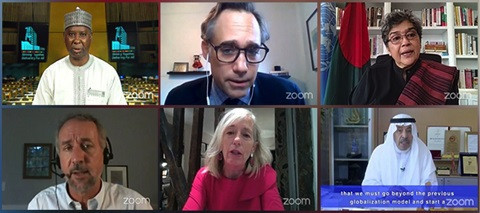On the margins of the annual UN High-Level Forum on the Culture of Peace, the International Peace Institute and the Office of the President of the General Assembly co-hosted a virtual policy forum entitled “Learning Interrupted: Education, Covid-19, and the Culture of Peace” on September 10th, 2020. This event provided an important platform for key stakeholders to shed light on some efficient responses to the global learning crisis while promoting culture of peace in the minds of young men and women.
In his opening remarks, H.E. Tijjani Muhammad-Bande, President of the 74th Session of the UN General Assembly, stressed the need for all governments to proactively and creatively address ongoing imbalanced access to quality education in order to promote a sustained culture of peace. He called on all Member States to give education primary consideration in all of their efforts to build back better and stronger.
“This crisis provides an opportunity to reimagine education –– to build more resilient education systems that respect diversity and work for all. A culture of peace is intricately linked to a culture of inclusion. This is the starting point for educational recovery –– pulling all the stops to ensure that the most marginalized children and youth return to school and learn in safe environments, with special attention to girls, refugees and conflict situations”, said Stefania Giannini. She pointed out that, to reorient education systems around a culture of peace, students must be wired to defend human rights, act for social justice, gender equality as well as care for the environment.
H.E. Rabab Fatima, Permanent Representative of the People’s Republic of Bangladesh to the UN, spoke highly of UNESCO’s tireless efforts in working with national governments to mitigate the impacts of the pandemic on education. She stressed the multiplier role that a culture of peace could play in “bringing back inclusivity in our pandemic response and SDGs implementation”. “The culture of peace can play a catalytic role to save humanity from the crisis by promoting inter-cultural and inter-religious dialogue, bridging divides and discrimination across and within societies, and fostering mutual respect, harmony and non-violence”, said Ambassador Fatima.
Calling on the entire international community to shoulder on responsibilities and avert a “generational catastrophe”, Stefania Giannini, UNESCO Assistant Director-General for Education, underscored the urgent need to prioritize education in the recovery and to invest more in social and emotional skills that must be mainstreamed throughout education systems.
Dr. Robert Jenkins, Chief of Education at UNICEF, believed that the global community now has a one-in-a-generation opportunity to reopen schools in new ways and to support schools and education systems to maximize the potential to transform learning, citing on-the-ground programs and initiatives in Brazil, Burkina Faso and Tanzania. “Focus on Reaching the most vulnerable students, transform the way learning is provided, meet the holistic needs of children”, Dr. Jenkins posed three clear messages and recommendations for governments.
URL:
https://en.unesco.org/news/reimagine-education-and-promote-culture-peace-face-global-pandemic


